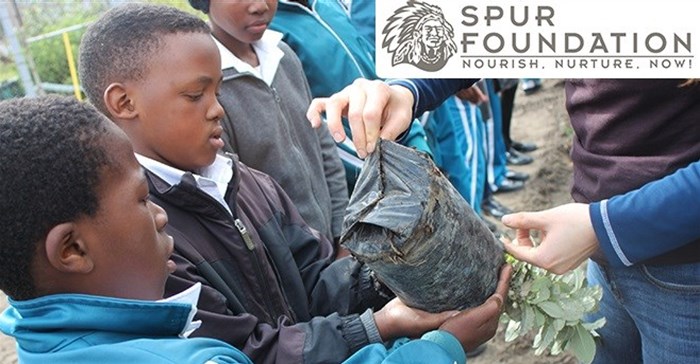Experts and academia continue to question whether current efforts in early childhood development are enough, especially when it comes to nutrition, with the global development spotlight falling squarely on the first 2,000 days of life.
Although experts agree that the situation for South African children between the ages of 0 and six has improved since 1994, the early childhood development (ECD) sector still faces significant challenges, including institutional capacity – few well-trained ECD staff and little in the line of effective instruction programmes, infrastructure and facility gaps funding and poor nutrition.
You can’t teach a hungry child
Ronel van Dijk, chairperson of the Spur Foundation and chief financial officer of Spur Corporation Limited, explains the Spur Foundation’s approach: “Investing in early childhood development is known to be one of the most effective means of eradicating poverty. In the words of United Nations secretary-general Ban Ki-moon: ‘The Sustainable Development Goals recognise that early childhood development can help drive the transformation we hope to achieve over the next 15 years’.
“At the Spur Foundation, our developmental focus remains strongly on the first 2,000 days, with particular emphasis on nutrition and early childhood development. We know that you can’t teach a hungry child, and during these first, formative years, the essential building blocks for brain and body development are laid.”
In their 2016 ‘State of the World’s Children’ report, UNICEF records that every child is entitled to the following basic rights: safety, health, play and education. But, the report continues: “Around the world, millions of children are denied these rights and deprived of what they need to grow up healthy and strong – because of their place of birth; because of their race, ethnicity or gender; or because they have a disability or live in poverty.”
Full tummies
The recent initiation of the Full Tummy Fund, a programme of the Spur Foundation, with Joint Aid Management (JAM) International as one of the foundation’s implementation partners, affirms the company’s long-term commitment to play its part in eradicating hunger in South Africa’s children. The Foundation supports the organisation’s ECD feeding programme and their 2016/17 grant will help to establish a feeding scheme in the Free State, providing a nutritious breakfast to 450 children in ECD Centres in Bloemfontein and Thaba Nchu. JAM’s breakfast feeding programme has its roots in a recipe developed by the World Food Programme (WFP) for a fortified porridge that can be mixed with water. It is a blend of partially precooked and milled cereals, soya, beans and pulses fortified with micronutrients (vitamins and minerals).
According to WFP, fortified blended foods (FBFs) are designed to provide protein supplementation to prevent and address nutritional deficiencies. The nutritional value per 100g of the porridge is:
▪ Energy (minimum) 380Kcal
▪ Protein (minimum) 18%
▪ Fat (minimum) 6%
▪ Micronutrients added: vitamins A, C, B12, D, E, K, B6, thiamine, riboflavin, niacin, pantothenic acid and folic acid, as well as plus zinc, iron, calcium and potassium.
This provides 70 to 75 percent of the children’s recommended daily allowance of macro- and micronutrients, and provides a vital boost to their development.
David Brown, managing director of JAM International said: “During 2015, the organisation increased its reach to six provinces in South Africa, and touched the lives of more than 84,000 children. In 2016, our goal is to reach 100,000 children with a Red Bowl of highly nutritious porridge every school day. Our relationship with the Spur Foundation allows us to continue this work, and offer more opportunities for intervention in the communities in which we currently have a presence.”
Laying a stronger educational foundation with sustainable food gardens
As part of the foundation’s commitment to early childhood development and nutrition, the Spur Foundation recently celebrated Mandela Day by selecting seven early childhood development centres in areas such as Diepsloot, Chesterville, Klapmuts and Khayelitsha to receive a ‘mini-makeover’. Three of the centres will pilot the first ‘Full Tummy Gardens’. These are sustainable food gardens, established and developed under the watchful eye of the JAM International fieldworkers with the goal of providing regular fresh produce for the ECD kitchens.
Not only will the gardens provide a much-needed source of fresh produce to supplement the children’s daily nutrition, allowing children to access the garden has important developmental implications. “It’s not just about the fun of getting dirty. Gardening helps children learn important lessons about patience while they wait for vegetables to grow, responsibility as they take over watering duties, and even loss when flowers die at the end of a season. “Gardening also provides opportunities to learn about science and nature – and provides invaluable lessons in cooperation and teamwork. But more than this is an understanding of where food comes from and the importance of agriculture,” van Dijk added.
“The Spur Foundation is taking the long view – South Africa can only grow if we are able to address the developmental challenges facing its citizens. By starting with children in the first six years of life, we are laying a stronger educational foundation upon which a healthier, more prosperous and better society may be built,” concluded Van Dijk.

































